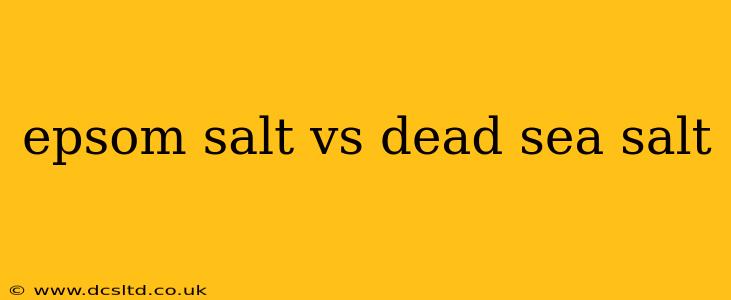Both Epsom salt and Dead Sea salt are popular choices for bath soaks and other wellness applications, but they have distinct compositions and benefits. Understanding their differences is crucial for choosing the right salt for your needs. This comprehensive guide will explore the key distinctions between Epsom salt and Dead Sea salt, helping you make an informed decision.
What is Epsom Salt?
Epsom salt, chemically known as magnesium sulfate (MgSO₄), is a naturally occurring mineral compound. It's not actually salt in the culinary sense; it's a hydrated magnesium sulfate. While it can be harvested from natural sources, it's often produced synthetically. The name "Epsom" originates from Epsom in Surrey, England, where it was first discovered.
Key Properties of Epsom Salt:
- High Magnesium Content: This is the key benefit. Magnesium is essential for numerous bodily functions, including muscle relaxation, nerve function, and blood sugar regulation. Absorbing magnesium through the skin via an Epsom salt bath is a popular method, although research on its efficacy is ongoing.
- Sulfate Content: Sulfates may help to flush toxins from the body, though more research is needed to confirm this effect.
- Generally Inexpensive: Compared to Dead Sea salt, Epsom salt is readily available and affordable.
What is Dead Sea Salt?
Dead Sea salt is harvested from the Dead Sea, a landlocked salt lake bordering Jordan and Israel. Its high mineral concentration is unique, containing a wide array of elements unlike Epsom salt.
Key Properties of Dead Sea Salt:
- Rich Mineral Profile: Dead Sea salt boasts a diverse range of minerals, including magnesium, potassium, calcium, bromide, and various trace elements. This complex blend is believed to offer a wider range of potential health benefits.
- High Mineral Density: The concentration of minerals is significantly higher than in seawater or other salts.
- Potentially Higher Cost: Due to its unique source and higher mineral concentration, Dead Sea salt tends to be more expensive than Epsom salt.
Epsom Salt vs. Dead Sea Salt: A Comparison Table
| Feature | Epsom Salt | Dead Sea Salt |
|---|---|---|
| Chemical Composition | Magnesium Sulfate (MgSO₄) | Complex mixture of various minerals |
| Primary Benefit | Magnesium absorption, muscle relaxation | Diverse mineral benefits, skin health |
| Mineral Content | Primarily Magnesium and Sulfate | Magnesium, Potassium, Calcium, Bromide, etc. |
| Cost | Generally less expensive | Generally more expensive |
| Availability | Widely available | More limited availability |
What are the Benefits of Epsom Salt?
- Muscle Relaxation: Epsom salt baths are often used to relieve muscle soreness and aches. The magnesium may help to relax muscles and reduce inflammation.
- Stress Reduction: The relaxing effect of an Epsom salt bath can contribute to stress relief.
- Improved Sleep: Some people report improved sleep after taking an Epsom salt bath, potentially due to the magnesium's calming effect.
What are the Benefits of Dead Sea Salt?
- Skin Health: Dead Sea salt is often used for its purported benefits for skin conditions such as eczema, psoriasis, and acne. The high mineral content may help soothe inflammation and improve skin hydration.
- Exfoliation: The slightly rough texture of Dead Sea salt can help exfoliate the skin, removing dead skin cells.
- Mineral Replenishment: The wide range of minerals may help replenish essential minerals lost through the skin.
Which Salt is Right for Me?
The best choice depends on your individual needs and preferences:
- Choose Epsom Salt if: You primarily seek magnesium absorption for muscle relaxation, stress relief, or sleep improvement, and are on a budget.
- Choose Dead Sea Salt if: You're looking for a broader range of mineral benefits, primarily for skin health and exfoliation, and don't mind the higher cost.
Are there any side effects to using Epsom salt or Dead Sea salt?
While generally safe, some individuals may experience minor skin irritation from either type of salt. Always test a small area before using a full bath. If you have any underlying health conditions, consult a doctor before using either type of salt for therapeutic purposes.
Can I use Epsom salt and Dead Sea salt together?
Yes, you can combine Epsom salt and Dead Sea salt in a bath, potentially benefiting from both magnesium and the diverse mineral profile of Dead Sea salt. Experiment to find a ratio you find comfortable.
This information is for educational purposes only and is not a substitute for professional medical advice. Always consult with a healthcare provider before using Epsom salt or Dead Sea salt for therapeutic purposes, especially if you have any underlying health conditions.
